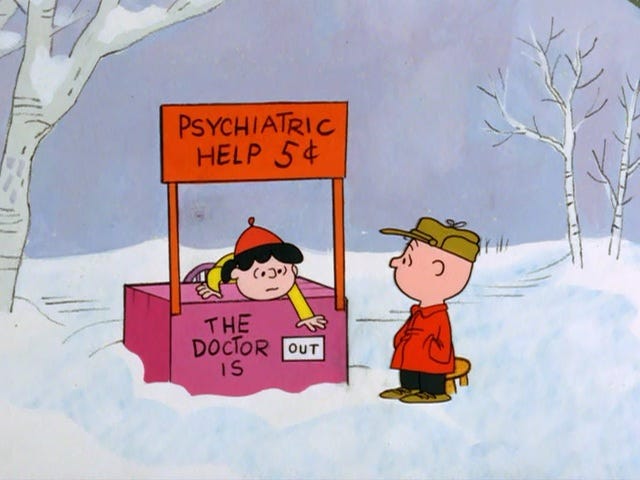In middle school, I wanted to be a therapist.
I already felt like one in many ways—as if I had my own therapist booth like Lucy’s in A Charlie Brown Christmas, offering psychiatric help for five cents (except my advice was free, the only price being my well-being.) I had assumed that role many times in relationships—platonic and romantic—and became the eternal shoulder to cry on.
To a detriment, I always wanted to be that one special person that someone (known to be usually-cold) could effortlessly open up to. They’d say something like, “I can’t believe I told you that” in pure belief of how they could trust someone so much so easily. Because of this need to fix, I attracted many broken people who often repaid me by breaking me in return, whispering “Thank you” as they shattered me. I’d watch them move on, flourishing without me, carrying the best parts of me with them. I’d be left behind, less than whole, hollowed out by giving. After giving my all to someone, I no longer had anything to give.
By high school, I no longer wanted to be a therapist.
I began to realize that being needed wasn’t the same thing as being loved, and oftentimes, offering people a safe place to fall meant they’d leave as soon as they felt steady again. I grew tired of being the emotional understudy, realizing that being the exception didn’t protect me from being disposable. It only made me convenient. I’d continue to hold the weight of other people’s pain with a smile plastered on my face, convinced that martyrdom was the key to intimacy. These people often used my tenderness as a stepping stone on to something better—something I wasn’t invited to be a part of. “You served your purpose,” they seemed to say as they left. I became a living reminder of the things they no longer wanted to remember—the ugly that I had made pretty for them. Sometimes, in building a safe place for someone else, you subject yourself to danger. You set yourself on fire to keep someone else warm.
I’ve noticed that many of us who become the “therapist friend” are handed invisible degrees in emotional labor before we even knew what to call it. We’re told we’re great listeners—attentive and quiet—as they unload onto us. For a fleeting moment, we feel good about it. We feel needed as they hug us, whispering a soft “Thank you” through their tears. We say “No problem” and actually believe it. Is it really a compliment to be called mature while wiping away someone else’s tears, or is it just a subtle form of permission to neglect ourselves?
I’ve been in countless scenarios where, before a “Hey” or “How are you?” is even spoken, I’m being unloaded onto—drenched in trauma and handed heavy turmoil. I’m called in times of crisis, but not in times of consideration. I’ve often assumed the role of co-owner in someone else’s emotional responsibilities, holding their grief as if it’s my own. I’ve cried over experiences I’ve never lived and felt responsible for outcomes I can’t control.
I’ve known people who treated me like a lifeline. When I failed to answer fast enough, it was taken as betrayal. I’ve been told I wasn’t trying hard enough to help, even when I was a shell of myself from trying too hard. I’ve endured pounding headaches, sleepless nights, and the shallow, breathless anxiety that comes from devoting my entire being to someone else’s pain. I feel sorry for the version of me who thought self-sacrifice was the price of love. Because in the end, I wasn’t cherished, I was used. I was treated like a necessity and then disgraced when I could no longer supply what they wanted.
It’s taken me years, but I’ve come to realize that empathy doesn’t require self-abandonment.
It doesn’t make you a bad person to confess that you cannot carry someone else’s weight. It is not cruel to love a person without being willing to bleed for them. My worth should not be measured by how much I endure. After all, it’s unrealistic to be everyone’s emotional life raft when we’re all just trying to stay afloat ourselves.
If you’d like to support me and my writing, you can consider buying me a coffee :)






As someone who went on to study to become a therapist, I still resonate deeply. Fixing other people as a way to foster intimacy never works out, you put it perfectly into words
Exactly me..I feel so guilty about feeling this way. Just to handle someone else's sadness I've even ruined my exams....I feel so numb nowadays but after reading this article I really feel seen for once...